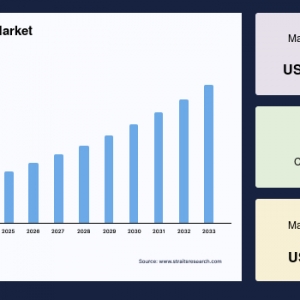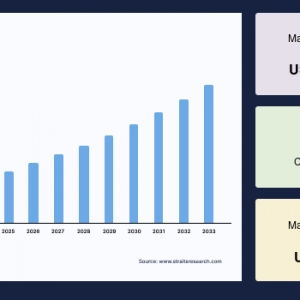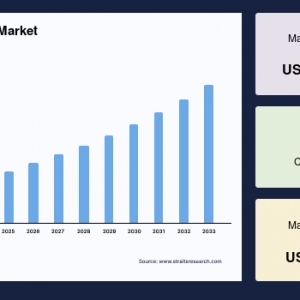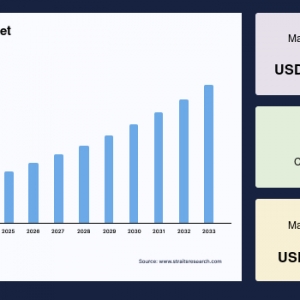The Egg Protein Powder Market was valued at USD 8.53 billion in 2024. It is expected to reach from USD 9.06 billion in 2025 to USD 13.72 billion in 2033, growing at a CAGR of 5.2% over the forecast period (2025-33).
Growing Popularity and Versatile Applications
Egg protein powder is valued for its rich amino acid profile, high digestibility, and functional properties like emulsification, gelling, and foaming. It finds widespread use in protein bars, dietary supplements, bakery products, and sports nutrition thanks to these qualities. Additionally, its lactose-free nature makes it suitable for lactose-intolerant consumers, increasing its penetration in the health and wellness sector.
Consumers increasingly seek protein supplements that promote muscle growth, recovery, and overall health. The rising number of fitness enthusiasts and the growing sports nutrition market contribute significantly to demand. Egg protein is also gaining traction in functional food formulations and infant nutrition, bolstered by ongoing advances in manufacturing technologies that enhance purity and solubility.
Regional Market Insights
North America leads the market in size, supported by extensive egg production, established food manufacturing infrastructure, and high health-conscious consumer base. The region’s demand is augmented by innovations such as cage-free and non-GMO egg protein products and new offerings like egg white chips. Europe, known for its strong bakery industry and growing protein supplement consumption, ranks second and is expected to show steady growth.
The Asia-Pacific region is poised for rapid growth driven by rising western diet influence, increasing disposable incomes, malnutrition reduction efforts, and government-backed nutrition initiatives. Countries like China, India, and Japan are key contributors to this expansion, with increased consumption in protein-enriched baked goods and nutritional supplements.
Market Segments Driving Growth
The egg white protein powder segment is the largest contributor, favored among athletes and food manufacturers because of its high protein synthesis rate and superior baking properties. The dietary supplements sector dominates application categories, fueled by consumer preference for convenient, health-promoting nutritional products that contain vitamins and bioactive ingredients. The food processing industry is also rapidly incorporating egg protein powders into various formulations because of their multifunctional characteristics.
Challenges and Competitive Landscape
Despite strong growth, the market faces challenges from competing protein sources such as whey, soy, and plant-based powders, which appeal to vegetarians and those allergic to eggs. Environmental concerns related to water pollution from egg protein production and health worries linked to cholesterol also influence consumer preferences.
Leading companies in the market emphasize innovation, strategic marketing, and sustainability initiatives to maintain competitive edges. Technologies improving extraction methods continue to enhance product performance, opening new application areas, such as infant formula and pharmaceutical nutrition, further broadening market potential.
Future Outlook
The egg protein powder market’s future growth is underpinned by expanding demand for high-protein, clean-label foods amid rising health awareness globally. Trends like ketogenic diets, weight management, and functional foods will bolster the market’s expansion. Moreover, digital marketing and e-commerce channels are increasing product accessibility worldwide.
In conclusion, the egg protein powder market is well-positioned for sustained growth, driven by its nutritional benefits, versatile uses, and increasing adoption in health-centric and functional foods across key regions and industry segments. Continued innovation and diversification will be pivotal in capturing new consumer bases and expanding market share in the years ahead.











